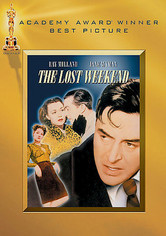The Lost Weekend-1945
Director Billy Wilder
Starring Ray Milland, Jane Wyman
Scott’s Review #856
Reviewed January 10, 2019
Grade: A
Billy Wilder, considered one of the most influential directors to emerge from the Hollywood Golden Age of cinema (the 1940s), creates a masterpiece tackling a social issues storyline until this time never explored before.
The Lost Weekend (1945) tells a tale of alcoholism and the desperation and degradation of an addict. Wilder bravely goes where no film had dared to go with astounding results.
The film was awarded several Academy Awards including Best Picture, Best Director, and Best Actor.
Don Birnam (Ray Milland) plays a New York writer left alone for the weekend one hot summer. His brother Wick (Philip Terry) and girlfriend Helen (Jane Wyman) are aware of Don’s drinking problem but leave for the weekend anyway when Don goes on a bender.
He spends each subsequent day desperate for liquor and in need of cash to purchase it. He resorts to theft and selling personal items out of desperation and the need for booze.
The story features flashbacks of past events when he first met Helen and an embarrassing attempt to meet her parents for lunch.
The film is adapted from the novel of the same name written by Charles R. Jackson in 1944. Assuredly a dark story that can be categorized as a downer the film does not paint a glamorous picture of the pains an alcoholic will go through or the lengths he will take out of desperation.
Before, The Lost Weekend was made drunkard characters in the film were largely portrayed as either bumbling or as comic relief, so this character study is a welcome departure from tradition.
Milland is perfectly cast and effectively relays the troubled and desperate Don. Handsome, well-dressed, and professional, he is not the stereotypical image of a drunk. Dressed in a suit and tie by all measures he does not fit the bill of a desperate man, but slowly begins his descent and spirals out of control.
This makes Wilder’s message more powerful as he shows that alcoholism can afflict anyone even professional, intelligent men. Milland, who resembles actor Jimmy Stewart is supposed to be liked by the audience eliciting a rooting factor even when he treats Helen badly. We want him to face his problems and recover.
Many glimpses of Manhattan are shown, and exterior shots are used plentifully. Wilder shoots the scenes as largely bleak and lonely which aligns with the overall feel of the film.
Third Avenue looks desolate and isolated as we watch a desperate Don wander around and attempt to sell his typewriter for booze money. He is grief-stricken when he realizes it is Yom Kippur weekend and therefore the pawnshops are closed.
The camera remains firmly fixed on Milland showcasing a range of powerful emotions throughout the film.
The Lost Weekend (1945) was a groundbreaking film at the time of release with a serious and detailed tale of the life and times of an alcoholic. With a wonderful acting performance by Milland, Wilder can portray the world of an addict darkly and frighteningly.
Decades later the film is still mentioned as inspirational to other filmmakers creating works about alcohol abuse.
Oscar Nominations: 3 wins– Best Motion Picture, Best Director-Billy Wilder (won), Best Actor-Ray Milland (won), Best Screenplay (won), Best Scoring of a Dramatic or Comedy Picture, Best Cinematography, Black-and-White, Best Film Editing
